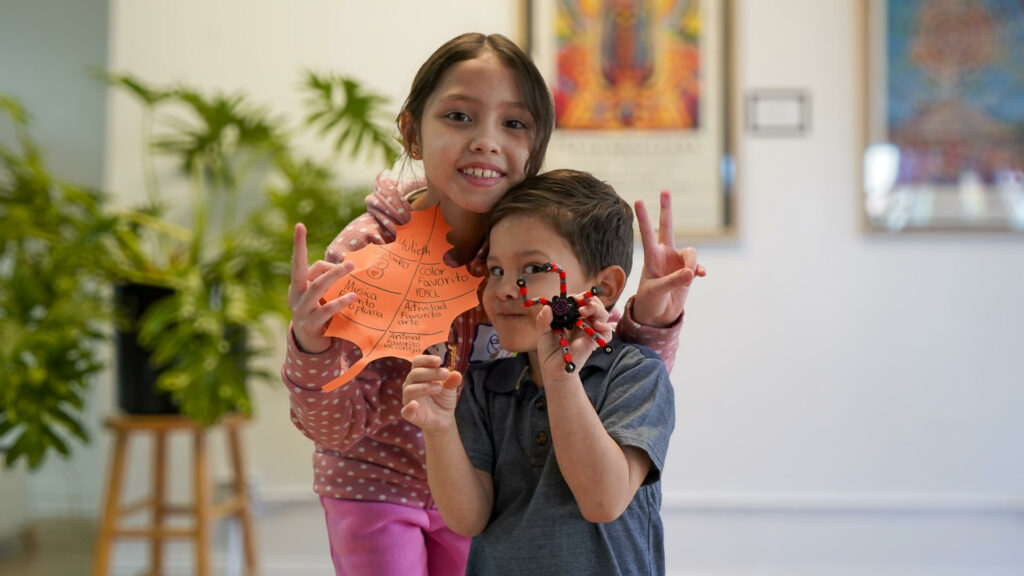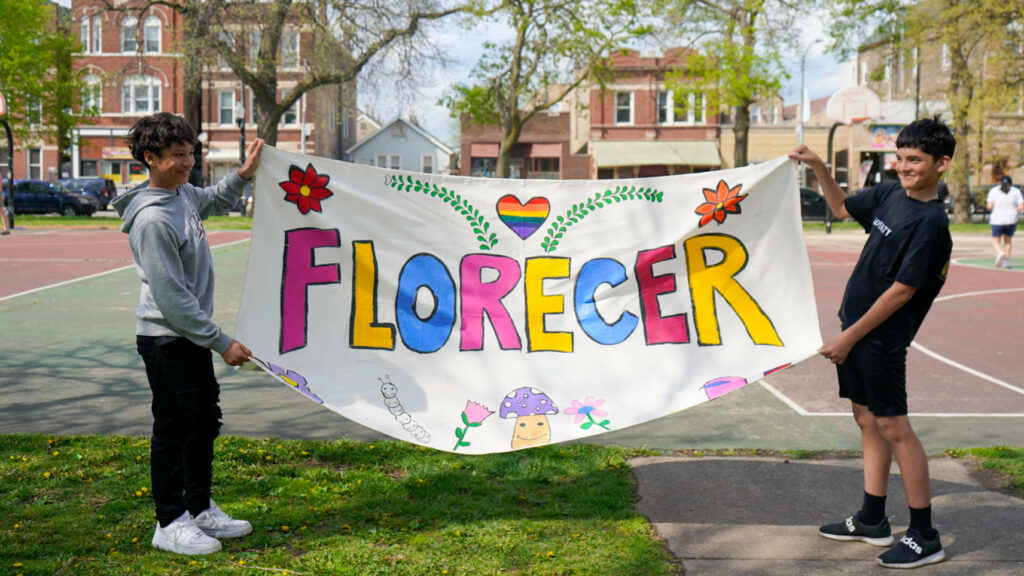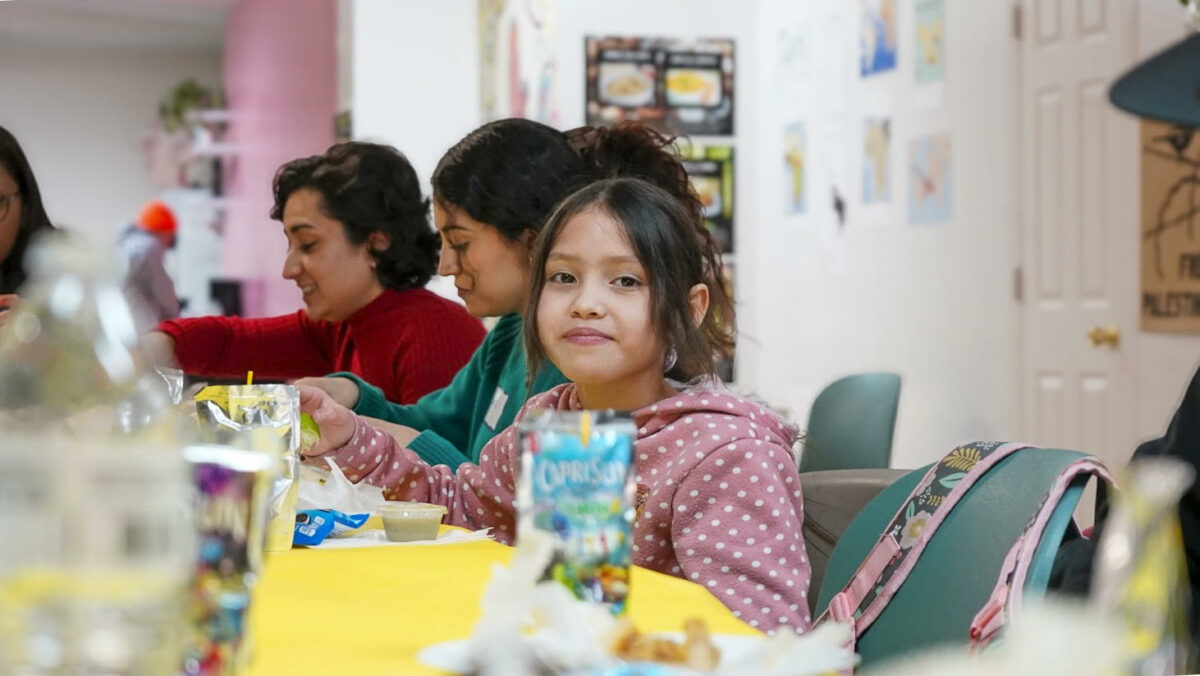Wendy Benitez arrived in Chicago from Venezuela in May 2023. She and her three children were bussed from the Texas border to meet her husband, who had already been in a Pilsen shelter for nine months. Within a month of her arrival, the family was able to move into an apartment through the city’s temporary rental assistance program.
Unable to immediately find work, Benitez looked after her three children, aged fifteen, thirteen and two. As she worked to enroll her two oldest children in school, she received information about a new learning program named Rincón de Aprendizaje, a ten-week education support program geared towards helping migrant students.
“It was to help the children with homework. If we were interested, we could register them, and I did,” Benitez said in Spanish. “Santiago, the [oldest] student, they helped him with his homework. And Owen, he’s a freshman in high school, [he needed] help with math and physics. They helped him catch up with his grade level. They like the activities.”
Rincón de Aprendizaje, which translates as “learning corner” in English, was born from organizers Jesus Hidalgo and Diego García noticing gaps in CPS’ response to the migrant crisis. “We were very much aware of the issues that came to be, the shortfalls that happened when some of the needs of newcomers weren’t being addressed,” Hidalgo said. “We decided to create the program in order to address those needs and restructure some things.”
To date, over 42,000 migrants have arrived in Chicago since the humanitarian crisis began in August 2022, according to the city’s new arrival dashboard. This crisis was reinforced by Texas Gov. Greg Abbott bussing individuals seeking asylum from the Texas border to sanctuary cities across the country, especially Chicago and New York City. The city has described the situation as “an unprecedented increase [in the] frequency of buses” since the announcement that Chicago would host the Democratic National Convention.
Chalkbeat Chicago reports that nearly 9,000 migrant students are enrolled in Chicago Public Schools.
García and Hidalgo say something missing from CPS’ approach to migrants is trauma-informed teaching that accounts both for what migrant children have gone through in their journey to the United States, and the adversity they face once in the city.
“As a collective of young Mexicans from the South Side of Chicago, we hear a lot of xenophobic comments that are made not only in the media, but also within our immediate community,” Hidalgo said. “It was important for us to directly interrupt that by greeting these young people and treating them with love and care and overall just dignity.”

The latest ten-week session operated from February to April out of 18th Street Casa de Cultura in Pilsen at 2057 West 18th St. “We’re community centered. We realize that a lot of these young people, if you wanted to access educational programs outside of school, they had to leave the neighborhood. So we met them where they were at, which was in Pilsen,” Hidalgo said.
The migrant shelter at 2241 S. Halsted St. in Pilsen, established in September 2023, has been at the center of controversy since December, when five-year-old Jean Carlos Martinez Rivero died from a combination of sepsis and other infections. The 40th Ward New Arrival Dashboard states the shelter housed 545 people as of May 24.
A large aspect of Rincón de Aprendizaje is providing opportunities for students to experience their community and new home in Chicago. Visits to places such as Harrison Park, the Rudy Lozano Library and even field trips to the Museum of Science and Industry allow new arrivals to see the city beyond a shelter. “When they had free time, they could take their [sports gear] to go out to the park,” Benitez said of her sons.
Wendy Rondon spent weeks traveling with her two children from Venezuela before arriving in the U.S. in April 2023. After being flown from Texas to Chicago through a San Antonio migrant resource center, she stayed in a Pilsen shelter. It was here where she met García. “Diego was a volunteer at the shelter,” she said. “He always had the task of taking the children to play games, do sports, go for walks, paint benches, plant bushes.”
As Rondon and García built a relationship, García shared with Rondon his plans to launch Rincón de Aprendizaje.
“There are several of us from the shelter that have children who were attending and started the [program]. And they attended every Saturday,” Rondon said. “[The program was] very important, because they live [in the house] locked up. Most of us live in the south and the children are afraid to go out. So they are always cooped up, they are not doing any sports, other than going home from school. [Program leaders] help [my kids] with their homework.”
Rondon’s children are ages twelve and thirteen, both attending Perez Elementary School in Pilsen. She praises what they’re learning at Rincón de Aprendizaje. “I think that the program reinforces what they are taught at school,” she said. “It is very good, because at school they can’t give them English lessons, they only have half an hour [to study], which doesn’t help them, because it’s hard for them. So you would have to put him in private English classes, and an English course is a bit expensive. And if you are arriving in the [U.S.], you don’t have the means to pay for a course.”
Rincón de Aprendizaje is offered as an initiative of Florecer, a queer grassroots violence prevention organization that provides youth and families on the Southwest Side opportunities to reimagine their communities through the arts, mutual aid and community building. The organization’s efforts began in 2020 during the demonstrations following the death of George Floyd.

“We mobilized students for educational equity, racial justice and organized different mutual aid distributions from parks, shelters and other community hubs,” Hidalgo said of that time. “In response to the recent influx of migrants in Chicago, we ended up pivoting our work by organizing different art programs at shelters, purchasing essential supplies for families staying at police stations and at the Todo Para Todos shelter, a mutual aid respite center that was operating in Pilsen from May to August of last year.” The volunteer-run shelter closed in September 2023 amidst a lack of funding and mounting logistical difficulties in running the warehouse location.
“Through that program, we were able to create connections with the children and, when it’s bigger than just the children, their family,” he continued. “We have sustained those connections long enough to now run the Rincón de Aprendizaje program this year.”
The program is funded by the Crossroads Solidarity Fund and, while other forms of funding are available, Hidalgo says the organization is wary of being associated with political entities.
“While we were funded by the Solidarity Fund, it really made me reflect on the ways in which I personally feel like the city has mismanaged funds,” Hidalgo said.
“This program really proved the power that comes with providing people on the ground with funds and the support to do this type of work…To see people on the ground come together and provide something so beautiful for young people, just really goes to show the power of funding communities and people on grants and mutual aid efforts.”
More information on Rincón de Aprendizaje and Florecer is available on the organization’s Instagram: @florecer_chi and Facebook.
Michael Liptrot is a staff reporter at South Side Weekly and the Hyde Park Herald. Leslie Hurtado is a freelance writer and interpreter at South Side Weekly.

